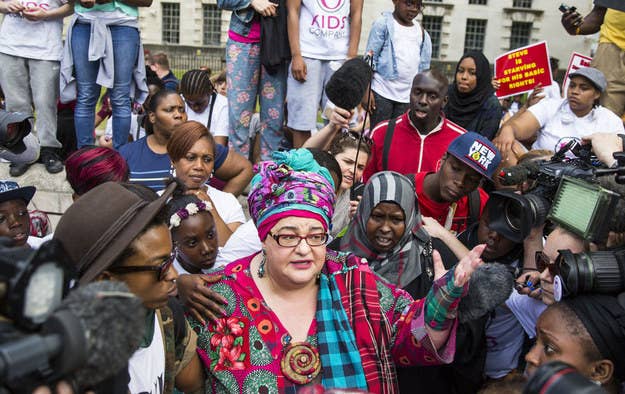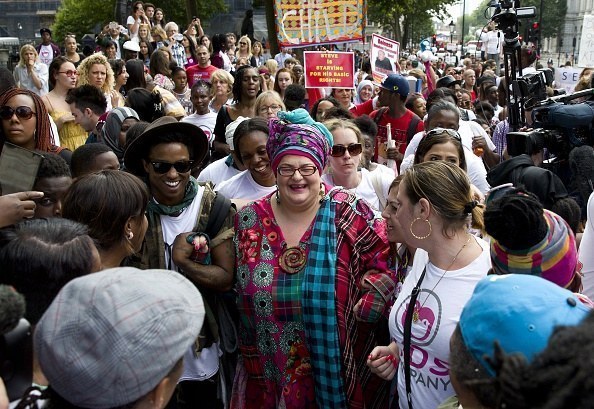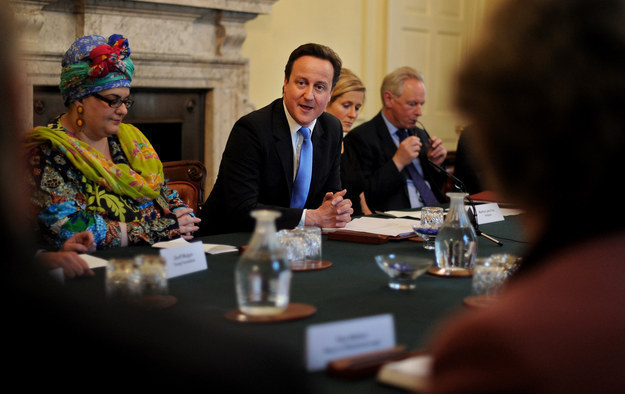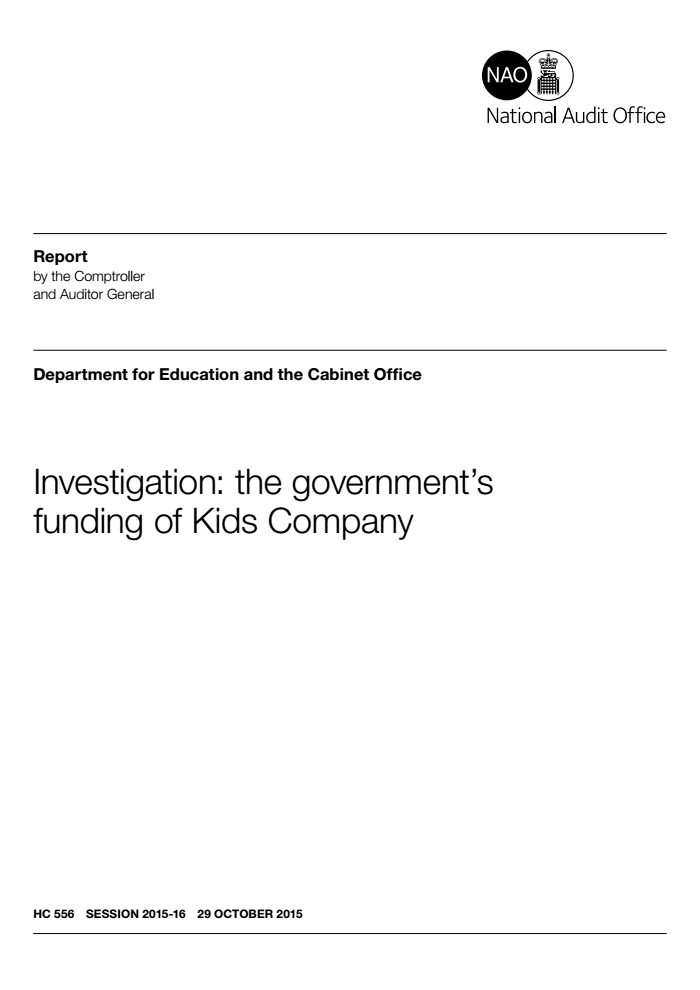
The chair of the influential House of Commons public accounts committee has described successive governments' funding of the Kids Company charity as "unbelievable" following the publication of a damning report by the official public spending watchdog.
The National Audit Office (NAO) report, released on Thursday, shows that the charity, which shut down in August, was kept afloat by the public sector for at least 15 years, receiving at least £46 million of taxpayers' money.
The report shows that prior to August, when the charity closed shortly after the Cabinet Office handed over a £3 million grant against the advice of its most senior civil servant, there had been a succession of previous incidents when ministers gave Kids Company money in the face of warnings from officials.
"Officials repeatedly expressed concerns about Kids Company, but the government continued to respond to the charity's requests for funding," the report says.
It goes on:
As far back as 2002, government records show officials were concerned about the charity's cash flow and financial sustainability. Officials also noted at that time that other organisations appeared to offer better value for money. Briefings to ministers in 2002, 2005, 2007, 2010, 2012 and 2015 show that officials accepted Kids Company's assertions that it would become insolvent without government grant funding.
Labour's Meg Hillier, chair of the public accounts committee, which will question senior government officials over the charity's closure on Monday, said: "It is unbelievable that over 13 years taxpayers' money has been given to Kids Company with little focus on what it was actually achieving for the children it was supporting.
"Government repeatedly raised concerns about Kids Company's finances but little action was taken. Despite this, government gave it further grants – funded by the taxpayer.
"Government departments have questions to answer about how they held the charity to account for spending taxpayers' hard-earned money. We will be quizzing key Government officials on Monday about their approach."

Since the charity's sudden closure this summer, it has become the subject of investigations by the Commons public administration committee, the Charity Commission, and the Metropolitan police, as well as Monday's public accounts committee hearing.
The NAO report describes "a consistent pattern of behaviour" each time the charity was reaching the end of the term for one of its government grants:
Kids Company lobby the government for a new funding commitment. If officials resisted, the charity would write to ministers expressing fears of redundancies and the impact of service closures. Around the same time, Kids Company would express the same concerns in the media.
Ministers ask officials to review options for funding Kids Company.
Officials would award grants to Kids Company, whether through a wider grant programme or – from 2013-14 onward – as a direct grant award.

In addition to the large amounts of government funding, the report notes that Kids Company's accounts for 2003 show that HM Revenue & Customs (HMRC) wrote off tax debts of £590,000 – a fact previously reported by the Mail on Sunday.
The report says that the majority of the charity's funding (£28 million) came from the Department for Education (DfE) and its predecessors. It received larger grants than any other charity from the department grant programmes.
The NAO report says: "In both 2008 and 2011, Kids Company successfully bid for funding under competitive grant programmes, and was awarded a total of £21.7 million, the largest amounts that any charity received under either programme."
However, the report goes on: "Kids Company has not had to compete for its annual grant since 2013. After it failed to win grants through the competitive process the DfE made a public interest case for continuing to fund Kids Company outside of the competitive process."
The report also notes that the government received a warning from a "public sector manager" months after the charity had been awarded a grant from the Invest to Save programme. The grant required the charity to "recruit a project manager for the grant funding, and to develop a management information plan to enable recording of outcomes".
The project manager apparently left four months later, and "highlighted concerns to DfE and to Kids Company's trustees about Kids Company's senior management structure and governance and about some of the individuals receiving cash payments from the charity".
According to the NAO, the DfE's files "do not contain any evidence of its response to these concerns". BuzzFeed News and BBC Newsnight have shown how the charity New Philanthropy Capital raised concerns over how this budget was being used with trustees in 2006, in a report described by a Cabinet Office official as "depressingly, annoyingly prescient".

The report flags the discrepancy between Kids Company's claims regarding its caseload and the number of files passed to local authorities when it closed, which was originally revealed by Newsnight and BuzzFeed News: "Kids Company reported that it worked with up to 36,000 children, young people and their family members. When it closed, the details of around 1,900 cases were passed to local authorities in London (1,699 cases) and Bristol (210 cases)."
It also cites some extraordinary figures regarding the charity's own measurement of its effectiveness. It describes how, in 2013, the DfE "awarded a £200,000 contract to Methods Consulting Ltd (Methods) to monitor and evaluate the grant funding to Kids Company." It says the reports submitted to Methods "regularly reported surpassing its delivery targets for the quarter, sometimes by substantial amounts".
Against a target of 1,347 interventions in 2013-14, the charity apparently delivered 30,217 interventions. However, the report states: "We did not find evidence that there were significant concerns from either Methods or the sponsor departments about the quality of Kids Company's data at the time."
The report also looks at the circumstances surrounding the charity's closure in 2015. It describes how the charity received a payment of £3 million only after a rare request for ministerial direction from civil servants. It says they had three reasons to raise concerns with ministers:
Kids Company had failed to meet the conditions agreed for the £4.3 million grant it had received in April 2015; a lack of confidence in the financial forecasts of future income provided by Kids Company; and concerns about the capacity and willingness of the charity's management to implement its restructuring plans.
While it was the first time officials had asked for a ministerial direction, the NAO says: "the concerns raised ... were not new concerns", citing similar discussions between ministers and officials at various government departments from 2002 onwards.

Cabinet Office ministers eventually decided to give the grant to the charity, though like previous grants, it was on condition of "an exit plan, setting out how it planned to operate on a sustainable basis in the future without a continued requirement for government funding".
This had happened several times in the years before 2015. The report notes that "repeated requests from Kids Company for government funding and decisions from the government to award funding suggest the charity never reached a position where it was sustainable and able to operate without government assistance".
Karl Wilding, director of public policy at the National Council for Voluntary Organisations, said: "The NAO report proves that Kids Company was an anomaly among charities. The majority of charities are well-governed and take their sustainability seriously.
"During a period when government grant funding to charities declined significantly, Kids Company received at least £42 million from seven different departments. What's more, it did so without much apparent accountability for how that money was spent. Most charities with government contracts or grants have to put together detailed bids and account carefully for every penny they spend.
"Despite its significant income, Kids Company chose not to build up financial reserves in the way responsible charities do in order to see them through lean times."


